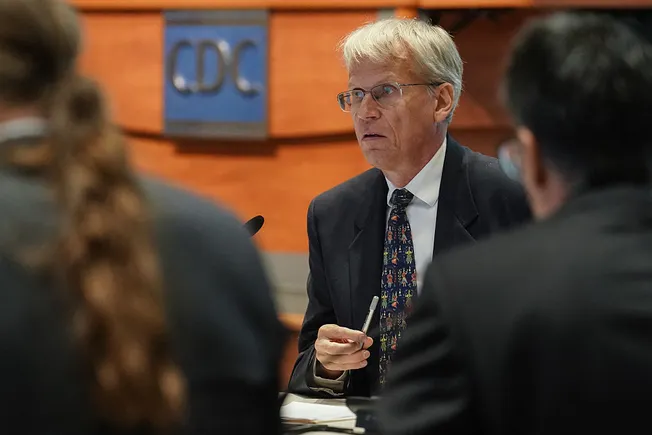Listen to the article
Robert F. Kennedy Jr.’s newly hand-picked panel of federal vaccine advisers met for the first time Wednesday since the HHS secretary abruptly fired their predecessors earlier this month.
While the advisers didn’t vote on any new recommendations, they probed aggressively into the evidence underpinning use of vaccines for COVID-19 and signaled plans to look at other established shots, like those for hepatitis B and measles.
“Secretary Kennedy has given this committee a clear mandate to use evidence-based medicine when making vaccine recommendations, and that is what we will do,” said Martin Kulldorff, a biostatistician and epidemiologist who now chairs the Centers for Disease Control and Prevention panel, known as the Advisory Committee on Immunization Practices.
“Vaccines are not all good or bad. If you think that all vaccines are safe and effective and want them all, or if you think that all vaccines are dangerous and don’t want any of them, then you don’t have much use for us,” Kulldorff added in his opening comments at Wednesday’s meetings.
Kulldorff also served as an expert witness in litigation against Merck & Co. over its HPV vaccine Gardasil, Reuters reported. He has said he was fired from Harvard University for objecting to COVID vaccine mandates.
ACIP is an important advisory body to the CDC, tasked with writing guidelines on use of approved vaccines for infectious diseases. Its recommendations dictate which shots insurers are required to cover.
Panelists are typically public health experts, often epidemiologists or infectious disease physicians. In mid-June, Kennedy sacked all 17 members of the panel and installed eight replacements. One, Michael Ross, withdrew before Wednesday’s meeting began, The New York Times reported.
Kennedy’s recasting of the panel has been widely criticized by medical associations. Sen. Bill Cassidy, a Republican from Louisiana who helped confirm Kennedy to his post, called earlier this week for the meeting to be delayed.
The advisers were scheduled to vote Wednesday on recommendations for RSV immunization in children, but weren’t able to get through their agenda in time. They’ll vote Thursday, when they plan to reconvene to discuss shots for influenza and chikungunya, as well as the mercury-based preservative thimerosal which has been a frequent target of vaccine skeptics.
Much of Wednesday’s discussion centered on messenger RNA shots for COVID-19. Several of the panel’s new members raised concerns about the lack of placebo-controlled data supporting continued use of updated vaccines. Retsef Levi, professor of operations management at the MIT Sloan School of Management, noted the potential for adverse events to be underreported in a federal monitoring program called Vaccine Adverse Event Reporting System, or VAERS.
The meeting fell notably behind schedule due to continuous questioning by the panelists of COVID data presented by CDC staff. Data presentations on Merck & Co.’s recently approved RSV antibody Enflonsia were rushed to accommodate voting proposals and public comments.
While discussion was limited, panelists did raise several issues around RSV immunization. Levi said he wanted more data on infant’s health status, hospital case and cause of disease to better judge the efficacy of RSV immunization. He also called for extra monitoring to see how efficacy might change over time.
Other members questioned whether co-circulating COVID might have impacted RSV rates, or if the antibodies could be susceptible to changes in the virus’ genetic makeup. Robert Malone, another panelist who’s questioned mRNA vaccines, wondered whether RSV immunization would interfere with other shots newborns receive.
However, Cody Meissner, a professor of pediatrics at the Geisel School of Medicine at Dartmouth and panelist, praised the RSV antibody Beyfortus and maternal vaccine Abrysvo.
“People should understand this is a truly spectacular accomplishment and will have enormous impact on public health,” he said.
On Thursday, advisers will vote on recommending Enflonsia for use in infants younger than 8 months who are born during or entering their first RSV season and aren’t protected by maternal vaccination. The language is similar to that for Beyfortus, another antibody drug that’s been marketed the past few years as an RSV preventative therapy.
Another vote will cover an updated resolution on RSV prevention for the Vaccines for Children program.


